英汉翻译技巧与实践绪论 (1)
- 格式:ppt
- 大小:65.50 KB
- 文档页数:10
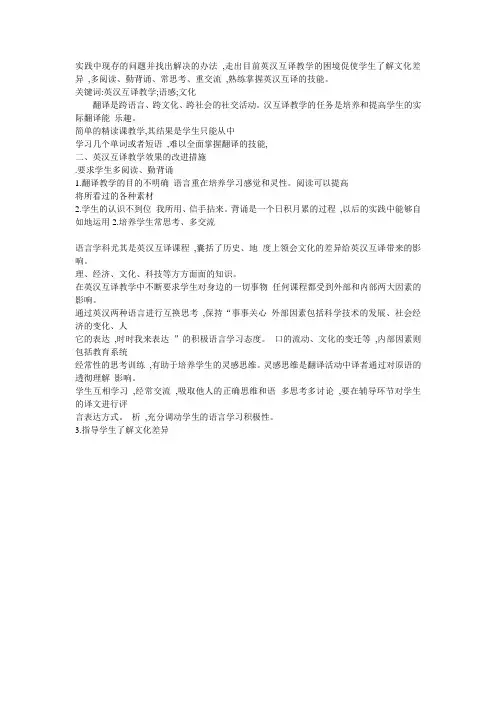
实践中现存的问题并找出解决的办法,走出目前英汉互译教学的困境促使学生了解文化差异,多阅读、勤背诵、常思考、重交流,熟练掌握英汉互译的技能。
关键词:英汉互译教学;语感;文化
翻译是跨语言、跨文化、跨社会的社交活动。
汉互译教学的任务是培养和提高学生的实际翻译能乐趣。
简单的精读课教学,其结果是学生只能从中
学习几个单词或者短语,难以全面掌握翻译的技能,
二、英汉互译教学效果的改进措施
.要求学生多阅读、勤背诵
1.翻译教学的目的不明确语言重在培养学习感觉和灵性。
阅读可以提高
将所看过的各种素材
2.学生的认识不到位我所用、信手拈来。
背诵是一个日积月累的过程,以后的实践中能够自如地运用2.培养学生常思考、多交流
语言学科尤其是英汉互译课程,囊括了历史、地度上领会文化的差异给英汉互译带来的影响。
理、经济、文化、科技等方方面面的知识。
在英汉互译教学中不断要求学生对身边的一切事物任何课程都受到外部和内部两大因素的影响。
通过英汉两种语言进行互换思考,保持“事事关心外部因素包括科学技术的发展、社会经济的变化、人
它的表达,时时我来表达”的积极语言学习态度。
口的流动、文化的变迁等,内部因素则包括教育系统
经常性的思考训练,有助于培养学生的灵感思维。
灵感思维是翻译活动中译者通过对原语的透彻理解影响。
学生互相学习,经常交流,吸取他人的正确思维和语多思考多讨论,要在辅导环节对学生的译文进行评
言表达方式。
析,充分调动学生的语言学习积极性。
3.指导学生了解文化差异。
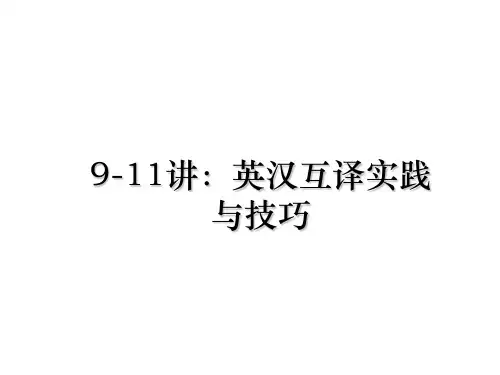
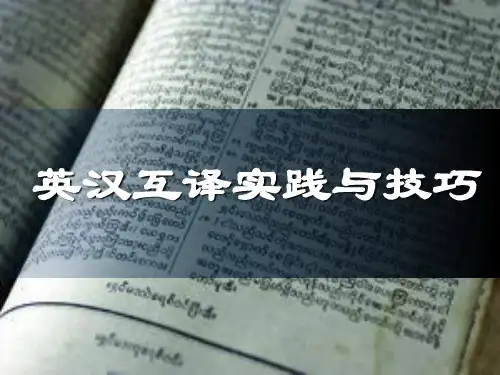
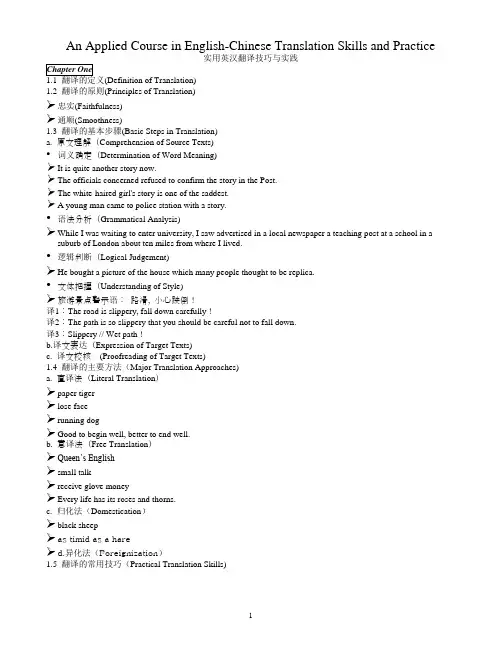
An Applied Course in English-Chinese Translation Skills and Practice实用英汉翻译技巧与实践(Definition of Translation)1.2 翻译的原则(Principles of Translation)忠实(Faithfulness)通顺(Smoothness)1.3 翻译的基本步骤(Basic Steps in Translation)a. 原文理解(Comprehension of Source Texts)•词义确定(Determination of Word Meaning)It is quite another story now.The officials concerned refused to confirm the story in the Post.The white-haired girl's story is one of the saddest.A young man came to police station with a story.•语法分析(Grammatical Analysis)W hile I was waiting to enter university, I saw advertised in a local newspaper a teaching post at a school in a suburb of London about ten miles from where I lived.•逻辑判断(Logical Judgement)H e bought a picture of the house which many people thought to be replica.•文体把握(Understanding of Style)旅游景点警示语:路滑, 小心跌倒!译1:The road is slippery, fall down carefully!译2:The path is so slippery that you should be careful not to fall down.译3:Slippery // Wet path!b.译文表达(Expression of Target Texts)c. 译文校核(Proofreading of Target Texts)1.4 翻译的主要方法(Major Translation Approaches)a. 直译法(Literal Translation)p aper tigerl ose facer unning dogG ood to begin well, better to end well.b. 意译法(Free Translation)Q ueen’s Englishs mall talkr eceive glove moneyE very life has its roses and thorns.c. 归化法(Domestication)b lack sheepa s timid as a hared.异化法(Foreignization)1.5 翻译的常用技巧(Practical Translation Skills)异&选择(Choice of Word Meaning)一词多义(Polysemous Words)•New homes are for sale.•I’ll see her home tonight.•He’s at home with classics.•Maternity home costs in America have gone up sharply.a. 语境与词义(Context and Word Meaning)A caller to the broadcasting station claimed responsibility for the bombing.T hroughout centuries London has claimed to be the foremost city of the world.b.词性与词义(Word Class and Word Meaning)M y room was big, light and looked out on the East lake.H e lighted his cigarette, said good night, and went on.c.文体与词义(Style and Word Meaning)•United States Declaration of Independence:He has affected to render the military independent of and superior to the civil power.•The third power of 2 is 8.2.2 引申翻译a. 具体化引申翻译(Extension from the Abstract or General Words to the Concrete Words)•抽象名词的具体化(Concreteness fromAbstract Nouns)T he car in front of me stalled and I missed the green.T he administration was free from corruption.•概括词语的具体化(Concreteness from General Words)A nimal waste is the best food for the soil.T he weather has a great effect on the farmer¡¯s work and the products of his work.b. 概括化引申翻译(Extension from the Concrete or Special Words to the General Words)H e was born with a silver spoon in his mouth.M y father is the bread earner.2.3 增补翻译(Addition)a. 语法增补(Grammatical Addition)•动词的增补(Addition of Verbs)I fell madly in love with her, and she with me.A fter the banquets, the concerts and the table tennis exhibition, he went home tiredly.•量词的增补(Addition of Measure Words)A red sun rose slowly from the calm sea.T he carefully planned party turned out to be a bad dream.•时态词的增补(Addition of Words Denoting Tenses)T he tutor had taught the girl to play the piano.T he old man said, “They say his father was ¡°a fisherman. Maybe he was as poor as we are.”译文:老头儿说: “听人说,从前他爸爸是个打鱼的。

英语翻译技巧与实践在当今全球化的时代,英语作为一种全球通用语言,被广泛应用于各个领域。
无论是商务交流、学术研究还是文化交流,英语翻译都扮演着重要的角色。
然而,英语翻译并非易事,需要掌握一定的技巧与实践经验。
本文将探讨英语翻译的一些技巧与实践方法,希望对广大英语翻译爱好者有所帮助。
首先,准确理解原文是英语翻译的基础。
在进行翻译之前,翻译者需要对原文进行仔细阅读和理解。
这包括理解文章的主题、结构、语气和背景信息等。
只有对原文有一个准确的理解,才能在翻译过程中准确传达原文的意思。
因此,翻译者需要具备良好的阅读能力和分析能力,以确保翻译的准确性和质量。
其次,翻译者需要注意语言的灵活运用。
英语和中文在语法、词汇和表达方式上存在很大的差异。
因此,翻译者需要具备灵活运用语言的能力,以确保翻译的流畅性和自然度。
在翻译过程中,翻译者可以适当调整句子结构和词汇选择,以使译文更符合目标语言的习惯和表达习惯。
同时,翻译者还需要注意语言的风格和语气,以确保译文与原文在语言风格上的一致性。
此外,翻译者需要注重专业知识的积累。
不同领域的翻译需要掌握相应的专业知识。
例如,医学翻译需要对医学术语和常用疾病名称有一定的了解;法律翻译需要对法律制度和法律术语有一定的了解。
因此,翻译者需要不断学习和积累相关的专业知识,以提高自己的翻译水平和专业素养。
此外,翻译者还可以利用各种翻译工具和资源来提高翻译效率和准确性。
例如,可以使用在线词典和术语库来查询生词和专业术语的翻译;可以使用翻译记忆库来提高翻译效率和一致性;可以使用语料库来查找类似语境下的翻译实例,以提高翻译的准确性和自然度。
当然,翻译工具和资源只是辅助工具,翻译者仍然需要运用自己的判断和专业知识来进行翻译。
最后,翻译者需要不断实践和反思,以提高自己的翻译能力。
翻译是一门艺术,需要不断的实践和经验积累。
只有通过实践,翻译者才能不断提高自己的翻译技巧和理解能力。
同时,翻译者还需要不断反思和总结自己的翻译经验,以发现自己的不足和进一步提高自己的翻译水平。
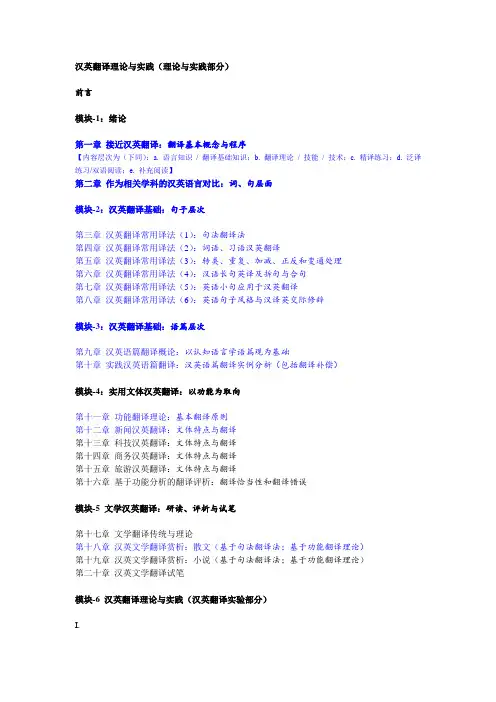
汉英翻译理论与实践(理论与实践部分)前言模块-1:绪论第一章接近汉英翻译:翻译基本概念与程序【内容层次为(下同):a. 语言知识/ 翻译基础知识;b. 翻译理论/ 技能/ 技术;c. 精译练习;d. 泛译练习/双语阅读;e. 补充阅读】第二章作为相关学科的汉英语言对比:词、句层面模块-2:汉英翻译基础:句子层次第三章汉英翻译常用译法(1):句法翻译法第四章汉英翻译常用译法(2):词语、习语汉英翻译第五章汉英翻译常用译法(3):转类、重复、加减、正反和变通处理第六章汉英翻译常用译法(4):汉语长句英译及拆句与合句第七章汉英翻译常用译法(5):英语小句应用于汉英翻译第八章汉英翻译常用译法(6):英语句子风格与汉译英交际修辞模块-3:汉英翻译基础:语篇层次第九章汉英语篇翻译概论:以认知语言学语篇观为基础第十章实践汉英语篇翻译:汉英语篇翻译实例分析(包括翻译补偿)模块-4:实用文体汉英翻译:以功能为取向第十一章功能翻译理论:基本翻译原则第十二章新闻汉英翻译:文体特点与翻译第十三章科技汉英翻译:文体特点与翻译第十四章商务汉英翻译:文体特点与翻译第十五章旅游汉英翻译:文体特点与翻译第十六章基于功能分析的翻译评析:翻译恰当性和翻译错误模块-5 文学汉英翻译:研读、评析与试笔第十七章文学翻译传统与理论第十八章汉英文学翻译赏析:散文(基于句法翻译法;基于功能翻译理论)第十九章汉英文学翻译赏析:小说(基于句法翻译法;基于功能翻译理论)第二十章汉英文学翻译试笔模块-6 汉英翻译理论与实践(汉英翻译实验部分)I.1、翻译技术与资源【实验指导书按单元编写,含实验目的及翻译环境条件、实验构成/过程、实验报告。
】2、汉英翻译基本技巧(1)3、汉英翻译基本技巧(2)4、汉英翻译基本技巧(3)5、汉英翻译基本技巧(4)6、汉英语篇翻译II.1、新闻汉英翻译2、科技汉英翻译3、商务汉英翻译4、旅游汉英翻译5、文学汉英翻译参考译文参考文献。
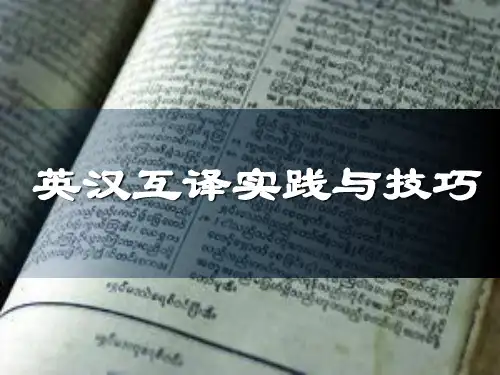
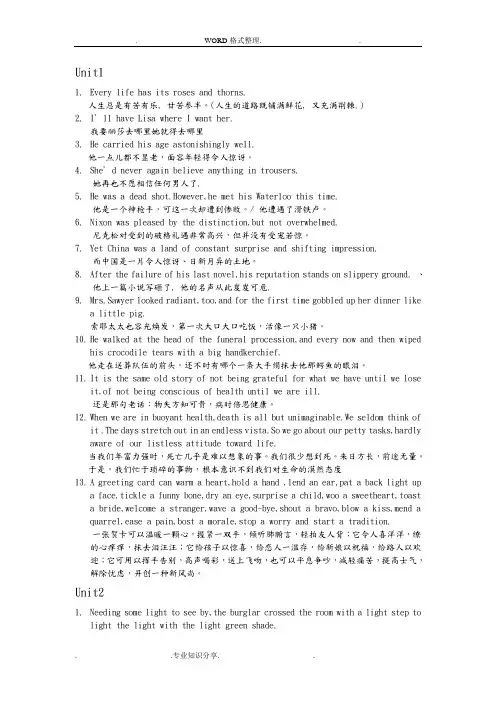
Unit11.Every life has its roses and thorns.人生总是有苦有乐, 甘苦参半。
(人生的道路既铺满鲜花, 又充满荆棘.)2.I’ll have Lisa where I want her.我要丽莎去哪里她就得去哪里3.He carried his age astonishingly well.他一点儿都不显老,面容年轻得令人惊讶。
4.She’d never again believe anything in trousers.她再也不愿相信任何男人了.5.He was a dead shot.However,he met his Waterloo this time.他是一个神枪手,可这一次却遭到惨败。
/ 他遭遇了滑铁卢。
6.Nixon was pleased by the distinction,but not overwhelmed.尼克松对受到的破格礼遇非常高兴,但并没有受宠若惊。
7.Yet China was a land of constant surprise and shifting impression.而中国是一片令人惊讶、日新月异的土地。
8.After the failure of his last novel,his reputation stands on slippery ground. 、他上一篇小说写砸了, 他的名声从此岌岌可危.9.Mrs.Sawyer looked radiant,too,and for the first time gobbled up her dinner likea little pig.索耶太太也容光焕发,第一次大口大口吃饭,活像一只小猪。
10.He walked at the head of the funeral procession,and every now and then wipedhis crocodile tears with a big handkerchief.他走在送葬队伍的前头,还不时有哪个一条大手绢抹去他那鳄鱼的眼泪。
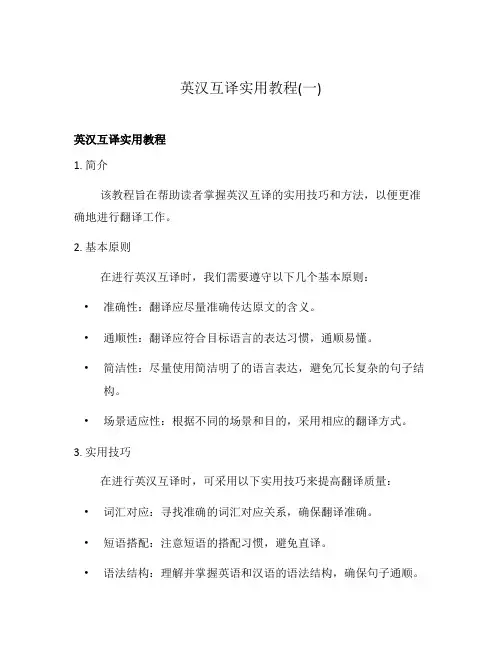
英汉互译实用教程(一)英汉互译实用教程1. 简介该教程旨在帮助读者掌握英汉互译的实用技巧和方法,以便更准确地进行翻译工作。
2. 基本原则在进行英汉互译时,我们需要遵守以下几个基本原则:•准确性:翻译应尽量准确传达原文的含义。
•通顺性:翻译应符合目标语言的表达习惯,通顺易懂。
•简洁性:尽量使用简洁明了的语言表达,避免冗长复杂的句子结构。
•场景适应性:根据不同的场景和目的,采用相应的翻译方式。
3. 实用技巧在进行英汉互译时,可采用以下实用技巧来提高翻译质量:•词汇对应:寻找准确的词汇对应关系,确保翻译准确。
•短语搭配:注意短语的搭配习惯,避免直译。
•语法结构:理解并掌握英语和汉语的语法结构,确保句子通顺。
•上下文理解:通过上下文理解原文的意思,以便更好地进行翻译。
•文化差异:考虑文化差异对翻译的影响,尽量做到意译。
4. 实例演练下面是一些实例演练,旨在帮助读者更好地理解和掌握英汉互译的实用技巧:1.英文句子:“The cat is on the table.” - 翻译成中文:“猫在桌子上。
”2.中文句子:“这是我的手机。
” - 翻译成英文:“This is my cell phone.”3.英文短语:“It’s raining cats and dogs.” -翻译成中文:“下大雨了。
”4.中文短语:“明天见。
” - 翻译成英文:“See youtomorrow.”5. 注意事项在进行英汉互译时,需注意以下几个事项:•专有名词:对于专有名词,应保持与原文一致。
•文化差异:根据不同的文化背景,适当进行意译,以便更好地传达信息。
•翻译细节:注意细节的处理,如时态、人称、单复数等。
6. 总结通过本教程的学习,读者可以掌握英汉互译的实用技巧和方法,提高翻译准确性和表达流畅度。
在实践中不断积累经验,不断提升翻译能力,才能成为一名出色的创作者。
希望本教程能帮助到您,在英汉互译的道路上取得更好的成绩!7. 深度学习在提高英汉互译能力的过程中,深度学习是一个重要的方向。
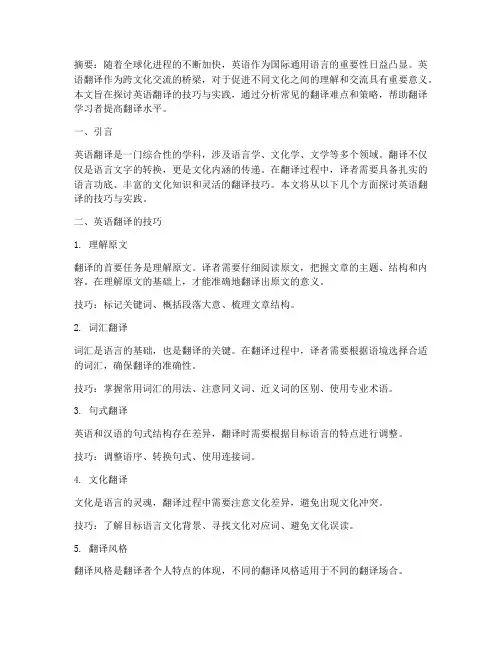
摘要:随着全球化进程的不断加快,英语作为国际通用语言的重要性日益凸显。
英语翻译作为跨文化交流的桥梁,对于促进不同文化之间的理解和交流具有重要意义。
本文旨在探讨英语翻译的技巧与实践,通过分析常见的翻译难点和策略,帮助翻译学习者提高翻译水平。
一、引言英语翻译是一门综合性的学科,涉及语言学、文化学、文学等多个领域。
翻译不仅仅是语言文字的转换,更是文化内涵的传递。
在翻译过程中,译者需要具备扎实的语言功底、丰富的文化知识和灵活的翻译技巧。
本文将从以下几个方面探讨英语翻译的技巧与实践。
二、英语翻译的技巧1. 理解原文翻译的首要任务是理解原文。
译者需要仔细阅读原文,把握文章的主题、结构和内容。
在理解原文的基础上,才能准确地翻译出原文的意义。
技巧:标记关键词、概括段落大意、梳理文章结构。
2. 词汇翻译词汇是语言的基础,也是翻译的关键。
在翻译过程中,译者需要根据语境选择合适的词汇,确保翻译的准确性。
技巧:掌握常用词汇的用法、注意同义词、近义词的区别、使用专业术语。
3. 句式翻译英语和汉语的句式结构存在差异,翻译时需要根据目标语言的特点进行调整。
技巧:调整语序、转换句式、使用连接词。
4. 文化翻译文化是语言的灵魂,翻译过程中需要注意文化差异,避免出现文化冲突。
技巧:了解目标语言文化背景、寻找文化对应词、避免文化误读。
5. 翻译风格翻译风格是翻译者个人特点的体现,不同的翻译风格适用于不同的翻译场合。
技巧:根据翻译目的和受众选择合适的翻译风格、注意原文的语气和情感。
三、英语翻译的实践1. 翻译实践的重要性翻译实践是提高翻译水平的关键。
通过实际操作,译者可以锻炼自己的翻译能力,积累经验。
2. 翻译实践的方法(1)阅读翻译作品:阅读优秀的翻译作品,学习译者的翻译技巧和风格。
(2)参加翻译培训班:参加专业翻译培训班,系统学习翻译理论和方法。
(3)翻译实践项目:参与实际翻译项目,提高自己的翻译能力。
(4)请教专业人士:向有经验的翻译者请教,获取宝贵的建议和指导。
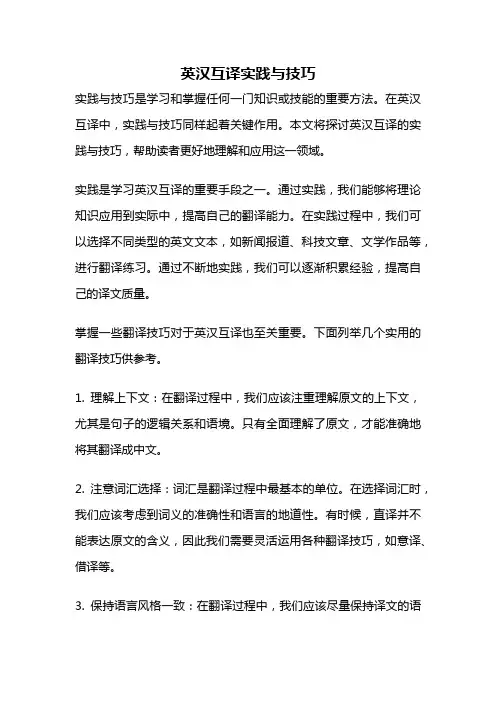
英汉互译实践与技巧实践与技巧是学习和掌握任何一门知识或技能的重要方法。
在英汉互译中,实践与技巧同样起着关键作用。
本文将探讨英汉互译的实践与技巧,帮助读者更好地理解和应用这一领域。
实践是学习英汉互译的重要手段之一。
通过实践,我们能够将理论知识应用到实际中,提高自己的翻译能力。
在实践过程中,我们可以选择不同类型的英文文本,如新闻报道、科技文章、文学作品等,进行翻译练习。
通过不断地实践,我们可以逐渐积累经验,提高自己的译文质量。
掌握一些翻译技巧对于英汉互译也至关重要。
下面列举几个实用的翻译技巧供参考。
1. 理解上下文:在翻译过程中,我们应该注重理解原文的上下文,尤其是句子的逻辑关系和语境。
只有全面理解了原文,才能准确地将其翻译成中文。
2. 注意词汇选择:词汇是翻译过程中最基本的单位。
在选择词汇时,我们应该考虑到词义的准确性和语言的地道性。
有时候,直译并不能表达原文的含义,因此我们需要灵活运用各种翻译技巧,如意译、借译等。
3. 保持语言风格一致:在翻译过程中,我们应该尽量保持译文的语言风格与原文一致。
如果原文是正式的,那么译文也应该是正式的;如果原文是口语化的,那么译文也可以选择相应的口语化表达方式。
4. 注意文化差异:英汉两种语言和文化有很大的差异,因此在翻译过程中,我们应该注意避免文化误解。
有时候,我们需要对原文进行文化适应,以便更好地传达原文的意思。
除了实践和技巧,还有一些其他的建议可以帮助我们提高英汉互译的水平。
多读多练。
通过阅读各种英文文本,我们可以提高自己的词汇量和语言表达能力。
同时,多做翻译练习也能够加深对语言的理解和运用。
多与他人交流。
在翻译过程中,我们可以向他人请教,分享自己的翻译经验。
通过与他人的交流,我们可以学习到更多的实践经验和技巧。
不断学习和提升自己。
英汉互译是一个复杂而庞大的领域,我们应该保持学习的态度,不断更新自己的知识和技能。
可以参加相关的培训班或翻译讲座,也可以参考相关的书籍和资料。
翻译理论与实践1(英译汉)实战练习15篇1.The Policy of Mass Media1) Life is indeed full of problems on which we have to make decisions as citizens or as private individual.2) But neither the real difficulty of these decisions nor their true and disturbing challenge to each individual can often be communicated through the mass media.3) The disinclination to suggest real choice which is to be found in the mass media is not simply the product of a commercial desire to keep the customers happy.4) The organs of the Establishment however well—intentioned they may be have a vested interest in ensuring that the public boat is not violently rocked and will so affect those who work within the mass media that they will be led insensibly towards forms of production which though they go through the motions of dispute and inquiry do not break through the skin to where such inquires might really hurt.5) They will tend to move when exposing problems well within the accepted cliché—assumptions of democratic society and will tend neither radically to question these clichés nor to make a disturbing application of them to features of contemporary life2. The American and the English1) Of the intrinsic differences that separate American from English the chief have their roots inthe obvious disparity between the environment and traditions of the American people since the seventeenth century and those of the English.2) The latter have lived under a relatively stable social order and it has impressed upon their souls their characteristic respect for what is customary and of good report.3) Until the World War brought chaos to most of their institutions their whole lives were regulated perhaps more than those of any other people save the Spaniards by a regard for precedent.4) The Americans though partly of the same blood have felt no such restrain and acquired no such habit of conformity.5) On the contrary they have plunged to the other extreme for the conditions of life in their country have put a high value upon the precisely opposite qualities of curiosity and daring and so they acquired that character of restlessness that impatience of forms that disdain of the dead hand which now broadly marks them.3. The Education of Humanists1)The education of humanists cannot be regarded as complete or even adequate without exposure in some depth to where things stand in the various branches of science particularly in the areas of our ignorance.2)Physics professors most of them look with revulsion on assignments to teach their subjects to poets.3) The liberal arts faculties for their parts will continue to view the scientists with suspicion and apprehension. 4) But maybe a new set of courses dealing systematically with ignorance in science will take hold.5) The scientists might discover in it a new and subversive technique for catching the attention of students driven by curiosity delighted and surprised to learn that science is exactly as some scientists described it: an “endless frontier.”6) The humanists for their part might take considerable satisfaction in watching their scientific colleagues confess openly to not knowing everything about everyone.7) And the poets on whose shoulders the future rests might late nights thinking things over begin to see some meanings that elude the rest of us.4. . American Study1) The scientific interest of American history centered in national character and in the workings of a society destined to become bast in which individuals were imp0rtant chiefly as types.2) Although this kind of interest was different from that of European history it was at least as important to the world.3) Should history ever become a true science it must expect to establish its laws not from the complicated story of rival European nationalities but from the economical evolution of a great democracy.4) North America was the most favorable field on the globe for the spread of a society so large uniform and isolated as to answer the purposes of science.5) There a single homogeneous society could easily attain proportions of three or four hundred million persons under conditions of undisturbed growth.6) In Europe or Asia undisturbed social evolution had been unknown.7) Without disturbance evolution seemed to cease.8) Wherever disturbance occurred permanence was impossible.9) Every people in turn adapted itself to the law of necessity.5. Jack London1) Life itself led London to reject this approach in his writing.2) He knew what it meant to be one of the disinheritedto be chained to the deadening routine of the machine and to soul-destroying labor for an insufficient reward.3) Consequently he swept aside not only the literature that pretended that ours is a society of sweetness and light but also that which contended that the inculcation of the spirit of Christian fellowship would put an end to class controversy.4) He did not oppose labor organization nor balk at the strike as a weapon of labor; rather he took his heroes and heroines from the labor movement and wove his plots within their struggles.5) He poured into his writings all the pain of his life the fierce hatred of the bourgeoisie that it had produced in him and the conviction it had brought to him that world could be made a better place to live in if the exploited would rise up and take the management of society out of the hands of the exploiters.6. President Carter1) President Carter has been calling his closest advisers together for what is called as a hard reappraisal of his administration’s troubles but who will tell him the truth? 2) You can almost put it down as a general rule in this town that presidents often invite “honest criticism” from their aides but seldom get it and usually don’t follow it when they do.3) The reasons for this are not obscure.4) The Oval Office is the most frightening room inAmerica.5) It imposes a kind of respect on most visitors and even those legislative lions who roar against the president on Capital Hill tend to usually lower their voices and follow their prepared speeches when they walk through the White House door.6) Few While House aides dare to say anything against the president without betraying their fears.7) Even Henry Kissinger who is not an excessively modest or silent man hesitated to face President Nixon with the disaster he knew lay ahead.7.On “Mein Kampf”1) Mein Kampf’s the me song recurring again and again is race race purity race supremacy though nowhere did Hitler attempt to define race.2) It was never intended by Nature Hitler claims that all races should be equal any more than individuals are equal.3) Some are created superior to others.4) The Germans as the world’s strongest race should rule over the inferior through having the habitat of the highest race extended and scattered Germanic peoples united under one rule.6) The vast expansion visualized by Hitler would take place principally at the expense of other races.7) To attain the objectives set by his soaring ambition Hitler proposes three methods: propaganda diplomacy and force. 8) Nowhere in Mein Kampf is the author more revealing of himself and his tactics than in his discussionof propaganda techniques—correctly believed by him to be one of the Nazis’ most effective and formidable weapons.8. How to Write Clearly1) I have never had much patience with the writers who claim from the reader an effort to understand their meaning.2) You have only to go to great philosophers to see that it is possible to express with lucidity the most subtle reflections.3) One cause of obscurity is that many writers think not before but as they write.4) The pen originates the thought.5) The disadvantages of this and indeed it is a danger against which the author must be always on his guard is that there is a sort of magic in the written word.6) The idea acquires substance by taking on a visible nature and then stands in the way of its own clarification.7) But this sort of obscurity merges very easily into the willful.8) Some writers who do not think clearly are inclined to suppose that their thoughts have a significance greater than at first sight appears.9) It is flattering to believe that they are too profound to be expressed so clearly that all who run may read and very naturally it does not occur to such writers that the fault is with their own minds which have not the faculty of precise reis with their own minds which have not the faculty of precise reflection.9. 1) Of course there is a strong element of luck in both success and failure but it is my belief that there are no “secrets” to success.2) One thing I have discovered is that attitudes and values that I acquired in China long before came to the United States have had a great bearing on the success in my business.3) These values have much in common with some of the virtues of Confucianism the Chinese philosophy that stresses moderation.4) However although I respect the spirit of Confucianism I have not tried to adapt this ancient Chinese philosophy to modern society.5) For besides moderation other things I have found to be essential to success are patience adaptability decisiveness confidence unconventional thinking social responsibility and last luck.6) The importance of these attributes is in their interaction.7) Some of them are antithetical to others—patience will often collide with decisiveness for instance—and yet it is hard to think of any of my decisions in which they did not play a role.10. Tragedy1) Our tragedy today is a general and universal physical fearso long sustained by now that we can even bear it.2) There are no longer problems of the spirit.3) There is only the question:4) When will I be blown up? 5) Because of this the young man or woman writing today has forgotten the problems of the human heart in conflict with itself which alone can make good writing because only that is worth writing about worth the agony and the sweat.6) He must learn them again.7) He must teach himself that the basest of all things is to be afraid; and teaching himself that forget it forever leaving no room in his workshop for anything but the old verities and truths of the heart the universal truths lacking which any story is ephemeral and doomed—love and honor and pity and pride and compassion and sacrifice.8) Until he does so he labors under a curse.9) He writes not of love but of lust of defeats in which nobody loses anything of value of victories without hope and worst of all without pity or compassion.11. The Choice of Life1) The lives of most men are determined by their environment.2) They accept the circumstances amid which fate has thrown them not only with resignation but even with goodwill.3) They are like streetcars running contentedly on their rails and they despise the motorcycle that dashes in and out of the traffic and speeds so jauntily across the open country.4) I respect them; they are good citizens good husbands and good fathers and of course somebody has to pay the taxes; but I don’t find them exciting.5) I am fascinated by the men few enough in all conscience who take life in their own hands and seem to mould it to their own liking.6) It may be that we have no such thing as free will but at all events we gave the illusion of it.7) At a cross-road it does seem to us that we might go either to the right or the left and the choice once made it is difficult to see that whole course of the world’s history obliged us to take the turning we did.12. Science Fiction1) Moreover if SF is the laboratory of the imagination its experiments are often of the kind that may significantly alter the subject matter even as they are being carried out.2) That is SF has always had a certain feedback effect on society as its visions emotionally engage the future consciousness of the mass public regarding especially desirable and undesirable possibilities.3) The shape a society takes in the present is in part influenced byits image of the future.4) For that matter some individuals in recent years have even shaped their own life-style after appealing models provided by SF stories.5) The diffusion of SF futuristic images of alternative societies through the media of movies and television may have speeded up and augmented SF’s social feed back effects.6) Thus SF is not only change speculator but change agent sending an echo from the future that is becoming into the present that is sculpting it.7) This fact alone makes imperative in any education system the study of the kinds of works discussed here.13. 1) Since the 1970s the Chinese community in the USA has undergone tremendous changes among which is its rapid increase in population as many Chinese have kept flooding into America’s shore.3) As the population of the American citize ns of Chinese descent has increased and their qualities have evidently improved so their economic conditions have prospered.4) It is said that since 1986 the US citizens of Chinese descent have leapt to a good lead over other racial minorities Japanese and Koreans for instance.5) The average Chinese family’s yearly income has now come to exceed that of the average American family.6) At present there is a number ofenterprisers of Chinese descent in the economic circles in the US who enjoy considerable fame.7) An even more cheerful phenomenon is that in recent years there have sprung up in the US prominent scientific and technical talents of Chinese descent.8) Their achievements have come to command the notice and admiration of scientists and technical experts in the world.9) Meanwhile Chinese-descent citizens have roles to play in American political circles as they have risen evidently in political status.14. Attitudes towards retirement vary from person to person.2) Some people think that they will enjoy their time in retirement, 3) but when it comes they may feel a little disappointed.4) Unwilling to resign themselves to the prospect of being put on the scrap heap they try to seek alternative outlets for their energies and alternative sources of income that employment can provede.5) Others have already prepared themselves for the significant change in their lives.6) Tired out after all exhausting life revolving around work they are anxious to relax in retirement with all the strains relieved.7) As there is no more need to rush to catch a morning bus and no more anxiety about promotion they now have enough time to fulfill an old dreamsuch as writing painting growing flowers and traveling around.8) On the whole female workers tend to have a more favorable attitude towards retirement than male workers.9) Withdrawal from employment to complete domesticity is a far less threatening experience for a woman than for a man.15. Mr. Zhang a retired miner bought four chicks early this yeae.2) One day he found one of them missing.2) He got so angry that he kept blaming his wife for it all the time.3) Towards evening into his yard came a chick followed by his neighbor Wang who ran to catch the chick.4) Naturally Zhang’s wife wouldn’t let him go with the chick.5) and so a quarrel ensued.6) It turned out that Wang had also lost one of his two chicks recently which he bought nearly the same time as Mr Zhang did.7) Their quarrel drew another neighbor Lee to the yard to see what was happening.8) Having heard the story he put the chick somewhere between their homes and let it off.9) The chick went straight to join Zhang’s flock and kept returning whenever it was driven to Wang’s home.10) And at Zhang’s call “Chick chick” all the chicks including the one in question recede in response to him.11) Wang had no more to say but made an immediate apologize. Thus ended the quarrel over a chick.。
第一单元翻译概论1翻译就是接受语言复制出与原语信息最接近的自然等值体---首先是就意义而言,其次是就风格而言.Translating consists in reproducing in the receptor language the closest natural equivalent of the source language message, first in terms of meaning, and secondly in terms of style.2按翻译技巧来分: 直译、意译、音译Literal translation does not mean word-for-word translation. Superficially speaking, it means ―not to alter the original words and sentences‖, strictly speaking, it strives ―to keep the sentiments and style of the original‖.例如:paper tiger—纸老虎Free translation is an alternative approach generally used to convey the meaning and spirit of the original without trying to copy its sentence patterns of figures of speech.例如:Adam’s apple—喉结;at sixes and sevens—乱七八糟It rains cats and dogs—大雨滂沱3按翻译原则方向来分: 异化翻译(Foreignization)和归化翻译(Domestication )归化的例子:as timid as a hare 胆小如鼠at a stone’s throw 一箭之遥wet like a drown rat 湿如落汤鸡as stupid as a goose 蠢得像猪5 傅雷:1951年在《高老头 重译本序》中提出―以效果而论,翻译应当像临画一样,所求的不在形似而在神似。